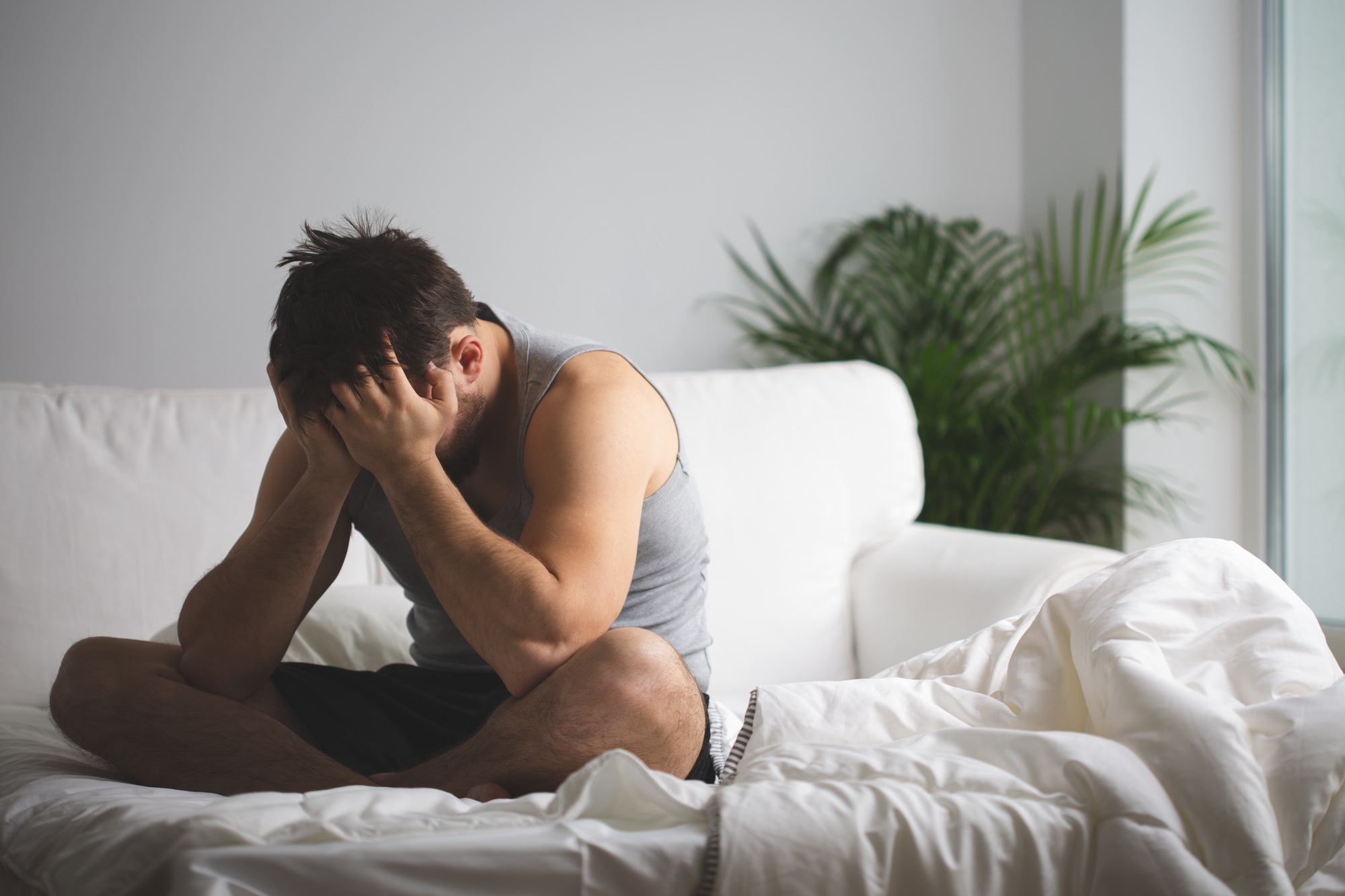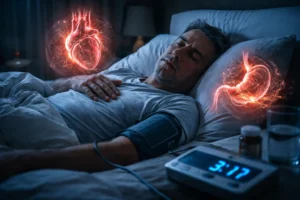Insomnia and depression are two conditions that often go hand in hand. They form a complex relationship that can be difficult to untangle.
Understanding this link is crucial. It can help those affected seek the right treatment and improve their quality of life.
This article aims to shed light on this intricate relationship. We will delve into the signs and symptoms of both conditions. We will also explore how they interact and influence each other.
We will discuss the various treatment options available. These range from cognitive behavioral therapy to medication management, and even lifestyle changes.
We will also touch on the importance of sleep hygiene in managing insomnia. This includes maintaining a regular sleep schedule and creating a conducive sleep environment.
Recognizing when professional help is needed is vital. We will guide you on when and how to seek this help.
Finally, we will emphasize the importance of early intervention. Addressing these conditions early can prevent them from escalating and causing further harm.
Join us as we navigate the complex world of insomnia and depression. Let’s take the first step towards better sleep and mental health together.
The Bidirectional Relationship of Insomnia and Depression
Insomnia and depression are deeply intertwined, influencing each other in profound ways. This bidirectional relationship can make management challenging. Understanding this relationship is key to tackling both conditions effectively.
Insomnia can often precede depression. Research shows that individuals with chronic insomnia have an increased risk of developing depression over time. Difficulty sleeping can fuel feelings of hopelessness and irritability, which are common in depression.
Conversely, depression can also lead to sleep disturbances. People experiencing depression often report insomnia as a symptom. Sleep disruptions are a hallmark of depression, creating a cycle of fatigue and discontent.
The relationship between these two conditions is not merely one-way. Each can exacerbate the other, leading to more severe symptoms and greater impairment. This dynamic can significantly impact mental health and daily functioning.
Key points to consider in this interplay are:
- Insomnia can predict the onset of depression.
- Depression can manifest as sleep disturbances, notably insomnia.
- Both can amplify the other’s symptoms, causing a vicious cycle.
Interventions targeting both conditions simultaneously tend to be most effective. By addressing insomnia and depression together, individuals can break this cycle. Comprehensive treatment can lead to significant improvements in mood and sleep.
Recognition of this bidirectional link is crucial for healthcare professionals. It guides effective treatment planning and improves patient outcomes. Early intervention and holistic approaches are essential in combating these conditions.
Recognizing the Signs and Symptoms

Insomnia and depression can manifest through various signs and symptoms. Recognizing these can aid in seeking timely treatment. Awareness is key to managing these conditions effectively.
Both insomnia and depression can have overlapping symptoms. This overlap can sometimes make diagnosis challenging. Nonetheless, each condition has unique indicators to note.
Individuals experiencing insomnia often show signs of constant tiredness. They may find it hard to stay asleep or wake up too early. These symptoms can impact daily life significantly.
Depression’s symptoms often encompass feelings of sadness and hopelessness. Loss of interest in previously enjoyed activities is also common. These signs can often go unnoticed or be mistaken for other issues.
When we talk about anxiety, it often co-exists with insomnia and depression. Anxiety can amplify the symptoms of both conditions, making them more severe. Recognizing anxiety’s influence is important for holistic treatment.
A good way to remember the symptoms of these conditions is through the following list:
- Difficulty falling or staying asleep (Insomnia)
- Early morning awakenings (Insomnia)
- Persistent sadness or low mood (Depression)
- Loss of interest in activities (Depression)
- Excessive worry or irritability (Anxiety)
- Difficulty concentrating (Anxiety)
Understanding these signs and how they relate is the first step toward managing insomnia and depression. Different symptoms may require different treatment approaches. Identifying them correctly can lead to more effective interventions.
Insomnia Symptoms
Insomnia can manifest in various troubling ways. Difficulty falling asleep is a classic sign. Many find their minds racing as they lie in bed, prolonging sleeplessness.
Some might fall asleep only to wake up during the night. Repeated awakenings can be frustrating and disruptive. Such patterns can result in overall poor sleep quality.
Early awakenings are another sign of insomnia. Waking up hours before the alarm can leave one feeling tired all day. These patterns can wear on anyone over time.
Depression Symptoms
Depression brings its own set of challenges and symptoms. Persistent sadness is a hallmark sign. This sadness often feels overwhelming and unshakable.
A noticeable loss of interest or pleasure in activities is common. Even hobbies that once brought joy may feel dull. This detachment can affect personal and professional life.
Feelings of worthlessness or guilt can accompany depression. Such thoughts can dominate one’s mental space. Depression can also lead to physical symptoms, such as fatigue.
When Anxiety Enters the Picture
Anxiety often intertwines with both insomnia and depression, complicating symptoms. Excessive worry characterizes anxiety, often leading to insomnia. This worry can prevent restful sleep, making one more prone to negative thoughts.
Physical symptoms like a racing heart or sweating can occur. These can further disrupt sleep and worsen depressive feelings. Anxiety can thus create a feedback loop with insomnia and depression.
Concentration issues are another sign of anxiety. Focusing on tasks becomes difficult when consumed by worry. This can amplify feelings of inadequacy tied to depression and lead to more sleep problems.
The Impact on Mental and Physical Health

Insomnia and depression can significantly affect both mental and physical health. The toll these conditions take is often profound and far-reaching. Prolonged disturbances can lead to a vicious cycle.
Mentally, both conditions can impair cognitive functions. Insomnia, in particular, can disrupt concentration and decision-making abilities. Depression exacerbates this by clouding judgment and diminishing motivation.
Physically, the effects can manifest as fatigue and lethargy. Lack of restful sleep due to insomnia wears down the body, affecting overall energy levels. Depression can further lead to appetite changes and weight fluctuations.
The impact extends to social and occupational spheres as well. Interpersonal relationships may suffer due to irritability and withdrawal. Professional performance often declines, leading to additional stress.
Chronic insomnia and depression can weaken the immune system over time. This makes the body more susceptible to illnesses. The cumulative effect on health can be severe if not addressed promptly.
Integrating treatment approaches is crucial. By addressing the mental and physical aspects, we can better manage the outcomes of insomnia and depression. Recognizing their full scope is the first step toward effective treatment.
Treatment Options for Insomnia and Depression
Addressing insomnia and depression requires a comprehensive approach. Treatment often involves a combination of therapies and lifestyle adjustments. Tackling both conditions simultaneously is ideal for effective management.
One popular approach is Cognitive Behavioral Therapy (CBT). This therapy focuses on altering harmful thought patterns that contribute to both insomnia and depression. It empowers individuals by equipping them with coping strategies. Learn more about CBT from the American Psychological Association.
Medication management is another common treatment route. Antidepressants can help regulate mood while certain medications improve sleep quality. Consulting with a healthcare provider is essential to find the right balance.
Lifestyle changes play a crucial role in treatment as well. Implementing regular exercise routines and maintaining a healthy diet can significantly improve symptoms. Sleep hygiene practices are also vital in managing insomnia.
Alternative therapies offer additional support. Methods such as mindfulness and yoga can reduce stress and enhance relaxation. These therapies can complement traditional treatments to provide holistic relief.
Effective treatment requires a personalized plan. Each individual may respond differently to various approaches. Therefore, collaborating with healthcare professionals is essential to develop a tailored strategy.
Cognitive Behavioral Therapy (CBT)
CBT is highly effective for both insomnia and depression. It focuses on changing negative thought patterns and behaviors. Through structured sessions, it helps individuals understand their thoughts.
CBT for Insomnia (CBT-I) specifically targets sleep issues. It involves techniques such as sleep restriction and stimulus control. These methods help restore regular sleep patterns over time.
CBT’s benefits are well-documented. It not only improves sleep but also alleviates depression symptoms. This dual impact makes CBT a recommended treatment option.
Medication Management
Medications provide significant relief for many individuals. Antidepressants can help elevate mood and curb depressive symptoms. However, consulting a doctor is crucial for finding the right medication.
Some sleep medications can aid those with persistent insomnia. These are often recommended for short-term use. Continuous monitoring by a healthcare provider ensures their efficacy and safety.
A tailored medication plan considers both conditions together. Adjusting dosages and timing can optimize treatment effectiveness. Regular follow-ups are necessary for managing side effects and assessing progress.
Lifestyle Changes and Home Remedies
Lifestyle adjustments greatly influence the management of insomnia and depression. Regular exercise is known to improve mood and promote better sleep. Physical activity helps release endorphins, reducing stress and anxiety.
Diet also plays a pivotal role. Consuming balanced meals rich in nutrients supports mental health. Avoiding caffeine and alcohol close to bedtime enhances sleep quality.
Home remedies can also provide relief. Practices like establishing a bedtime routine and maintaining a sleep diary help create a conducive environment for rest. Consistent sleep schedules are vital.
Alternative Therapies
Alternative therapies offer additional avenues for relief. Mindfulness-based practices such as meditation can boost mental resilience. These techniques aid in relaxation, helping alleviate anxiety and insomnia.
Yoga is another powerful tool. It combines physical postures with breathing exercises to reduce stress. Regular practice fosters a sense of calm, encouraging better sleep patterns.
Acupuncture is gaining recognition for its potential benefits. This ancient practice can help regulate mood and improve sleep. As part of an integrated treatment plan, these therapies can enhance well-being.
The Role of Sleep Hygiene in Managing Insomnia
Sleep hygiene plays a crucial role in managing insomnia. It involves creating an environment and daily routine conducive to restful sleep. By developing healthy sleep habits, individuals can significantly improve their sleep quality.
Good sleep hygiene encompasses several practices. These practices not only enhance sleep but also help manage the symptoms of depression and anxiety. Consistent routines signal the body that it’s time to unwind.
Some essential practices for good sleep hygiene include:
- Keeping a regular sleep schedule, even on weekends
- Creating a comfortable sleep environment, free from noise and light
- Limiting screen time before bed to reduce blue light exposure
- Avoiding heavy meals, caffeine, and alcohol in the hours leading up to bedtime
Incorporating these practices can lead to better sleep over time. Sleep hygiene is about consistency and making conscious choices. It’s not just about what you do at night but also your activities throughout the day.
By focusing on sleep hygiene, individuals empower themselves to manage insomnia more effectively. It’s an important step towards improving both physical and mental health. Integrating these changes into daily life can have lasting benefits.
Seeking Professional Help: When and How
Recognizing when to seek professional help for insomnia and depression is crucial. Persistent symptoms that interfere with daily life indicate it’s time to consult a healthcare provider. Ignoring these issues can lead to worsening mental health.
A healthcare professional can offer tailored strategies for your needs. They may suggest medication, therapy, or a combination of treatments. Early intervention can prevent the progression of insomnia and depression.
Taking the first step can feel daunting, but it’s essential. Reach out to a doctor, therapist, or mental health professional. They can guide you in finding an effective treatment plan and provide support throughout your journey.
The Importance of Early Intervention
Addressing insomnia and depression promptly can prevent potential complications. Early intervention often leads to more effective treatment outcomes. Ignoring symptoms can lead to a worsening of both conditions over time.
Timely treatment helps in managing symptoms before they escalate. Early intervention can also reduce the risk of developing additional mental health issues, such as anxiety. Effective management may involve therapy, medication, or lifestyle changes tailored to individual needs.
Moreover, early intervention can improve an individual’s quality of life significantly. It enables better daily functioning and supports maintaining healthy relationships and work performance. By seeking help early, individuals position themselves on the path to recovery and well-being.
Conclusion: Taking the First Step Towards Better Sleep and Mental Health
Understanding the link between insomnia and depression is vital. Awareness is the first step toward effective management. Once you recognize the symptoms, seeking professional guidance becomes crucial.
Taking action is empowering. Whether through therapy, medication, or lifestyle adjustments, help is available. With the right support, achieving better sleep and improved mental health is possible. Start your journey today, prioritizing your well-being.








